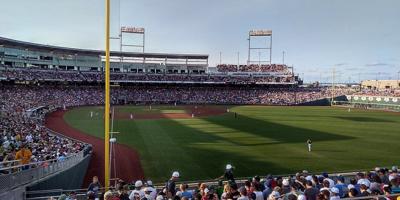
TDAmeritrade Park, Omaha, Nebraska, home of the College World Series
SACRAMENTO - Lawyers who secured a $49.25 million settlement from the NCAA on behalf of a group of hundreds of full-time assistant college baseball coaches allegedly illegally classified as "volunteers" say they are owed nearly $15 million for their work on the case.
On July 2, attorneys with the firm of Korein Tillery, of St. Louis, asked a Sacramento federal judge to award them 30% of the settlement in fees.
In the motion presented to U.S. District Judge William B. Shubb, of the Eastern District of California, the Korein Tillery attorneys noted the legal action led the NCAA to abandon a longstanding bylaw that Division I schools had used for decades to allegedly extract full-time work from assistant baseball coaches for free, even as the schools and NCAA raked in big money from college baseball games, television broadcasting and merchandise and head coaches routinely earned more than $1 million annually.
They also noted the settlement with the NCAA would lead to class member baseball coaches receiving an average of $33,000 per year they worked as an unpaid "volunteer." The settlement agreement requires a payment of at least $5,000 per year worked for the unpaid baseball coaches.
They said the outcome of the settlement easily should allow them to claim 30% of the settlement funds.
"The NCAA’s volunteer coach bylaw had existed since 1992, and no coach had challenged the bylaw until Plaintiffs and their counsel filed this lawsuit. That was likely because of the great risk and expense that litigating an antitrust lawsuit against an entity such as the NCAA entails," the attorneys wrote.
"Yet after this case was filed, the NCAA abolished the bylaw for all sports, a change that benefits hundreds of baseball coaches and hundreds more coaches in other sports. And after most of discovery was completed, the NCAA agreed to pay over 90% of class members’ alleged damages."
The motion for attorney fees comes a little over two months since Shubb granted preliminary approval to the settlement.
The Korein Tillery lawyers had filed suit in 2022 in Sacramento federal court on behalf of named plaintiffs Taylor Smart and Michael Hacker.
According to court documents, Smart had worked as a "volunteer" assistant baseball coach at the University of Arkansas from 2018-2020. Hacker had worked in that role at the University of California at Davis from 2019-2021.
According to the complaint, the two were among hundreds of other college assistant baseball coaches designated as unpaid "volunteers" under an NCAA bylaw, established by agreement among the NCAA's 300 member schools with baseball programs.
While head baseball coaches can earn more than $1 million annually, and two assistant coaches may typically earn up to $300,000 each, the NCAA schools agreed to allow schools to keep on staff a third assistant designated as a volunteer.
That third assistant would often perform key duties for the team, including serving as a base coach during games, while also attending to other duties during games and in practices, including serving as hitting coach, baserunning coach, or infield or outfield coach, among others.
Smart and Hacker, for instance, also were assigned to help run practices, create scouting reports, and help hitters and pitchers break down game film to aid in player development, among other duties.
According to court documents, the so-called volunteer coaches typically worked similar hours to other assistants, yet were unpaid for their work.
According to the complaint, those coaches could find other work on campus to earn money, such as coordinators of youth athletic camps. However, those jobs came on top of their regular baseball coaching duties.
In the lawsuit, the plaintiffs accused the NCAA of violating federal antitrust law, California's unfair competition law and other laws in other states.
While the case remained pending, the NCAA rescinded the bylaw at the heart of the case and no longer allowed schools to keep an unpaid "volunteer" baseball coach on their staff.
The NCAA then agreed to settle the action for $49.25 million. According to court documents, the settlement could include as many as 1,000 current and former college baseball coaches who served as a "volunteer coach" from November 2019 to July 2023.
As part of the settlement agreement, attorneys were allowed to request up to 30% of the settlement fund as fees.
The former coaches would receive a total of $32.8 million. In his order granting preliminary approval, Shubb noted that figure represents about 66% of the total $49.8 million damages calculated by the plaintiffs' expert witness.
Including attorney fees, the settlement would amount to about 90% of those total possible damages.
The judge agreed the settlement "represents a strong result for the class" and was "comfortably within the range" considered "reasonable" by courts.
A hearing to consider the fee request and to consider granting final approval to the settlement is scheduled for Sept. 15.
Anyone wishing to be excluded from the settlement must file that request by July 14.
Plaintiffs have been represented by attorneys Stephen M. Tillery, Steven M. Berezney and Garrett R. Bros, of Korein Tillery.
The NCAA has been represented by attorney Carolyn Hoecker Luedtke, and others with the firm of Munger Tolles & Olson, of San Francisco.




